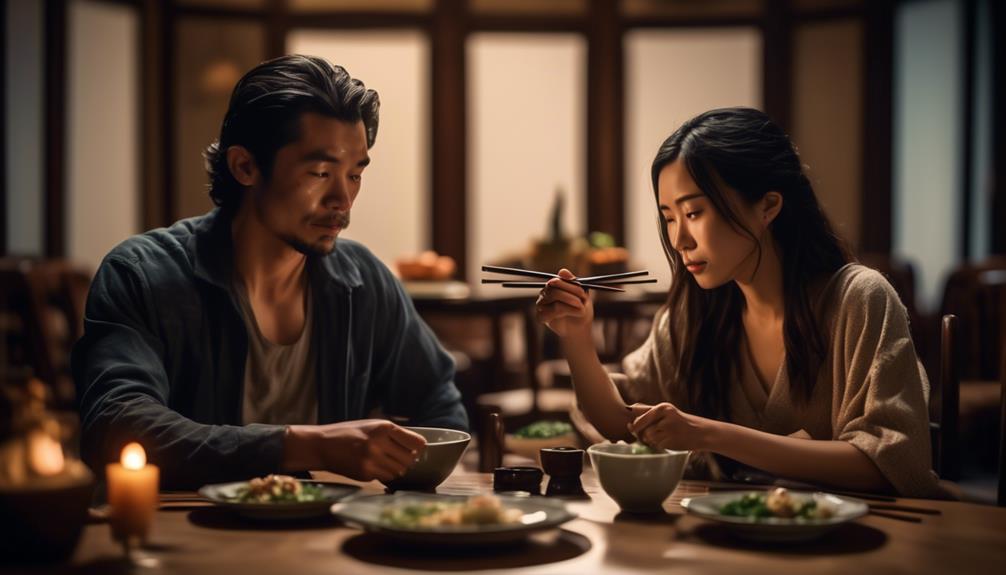What to Do When Facing Cultural Differences in Marriage

Imagine standing at the intersection of two vibrant, diverse cultures, ready to embark on a journey of love and companionship.
As you take your first steps into the realm of marriage, you soon realize that navigating through cultural differences can be both enriching and challenging. How do you ensure that these differences become a source of strength, rather than a cause for conflict?
In this discussion, we will explore practical strategies and helpful insights on how to embrace and navigate cultural differences in your marriage, fostering a deeper understanding and connection with your partner.
So, let's embark on this journey together, and discover the keys to a harmonious and fulfilling multicultural union.
Key Takeaways
- Appreciate and embrace your partner's cultural background.
- Foster open and honest communication about experiences and traditions.
- Seek to understand and respect each other's cultural differences.
- Continuously learn and grow together by educating yourselves about each other's cultures.
Understanding Your Partner's Cultural Background
To build a strong and harmonious marriage, it's essential to understand and appreciate your partner's cultural background. Cultural sensitivity is crucial in navigating traditions and ensuring a deep connection with your spouse. Each culture has its own unique set of customs, values, and beliefs, and taking the time to understand and respect these differences can foster a sense of unity and strengthen your bond.
Start by engaging in open and honest conversations with your partner about their cultural background. Ask questions and listen attentively, showing genuine interest in their experiences and traditions. This won't only deepen your understanding but also demonstrate your respect and willingness to learn.
As you navigate the traditions that come with your partner's culture, it's important to approach them with an open mind and a willingness to adapt. Embrace the opportunity to learn and participate in these traditions, as they're an integral part of your partner's identity. By actively engaging, you won't only gain a deeper appreciation for your partner's culture but also create shared experiences that can strengthen your relationship.
Open and Honest Communication
When it comes to open and honest communication in marriage, it's important to establish clear communication strategies that allow for understanding and connection. This includes actively listening to your partner, expressing your thoughts and feelings openly, and being receptive to their cultural background.
To bridge any cultural gaps, it's crucial to educate yourself about your partner's culture, traditions, and values, and to respect and appreciate these differences.
Clear Communication Strategies
Open and honest communication is key in fostering understanding and resolving cultural differences within marriage. When faced with cultural sensitivity in your relationship, effective cross-cultural communication strategies can help you navigate through challenges.
Start by actively listening to your partner's perspective, showing empathy and respect for their cultural background. Be open to learning about their customs, traditions, and values, and share your own as well. Use clear and concise language to express your thoughts and feelings, avoiding assumptions or stereotypes.
It's important to ask questions to clarify any misunderstandings and seek common ground. Practice patience and avoid jumping to conclusions. Remember, the goal isn't to change or erase cultural differences, but to find ways to appreciate and celebrate them within your marriage.
Bridging Cultural Gaps
Start by embracing cultural differences and approaching them with curiosity and compassion in order to bridge gaps in communication within your marriage. Navigating traditions and customs from different cultures can be challenging, but with open and honest communication, you can create a stronger bond with your partner.
To effectively bridge the communication gap, it is essential to understand and respect each other's cultural backgrounds. This means actively listening and asking questions to gain insights into your partner's traditions and beliefs. By doing so, you can foster a deeper understanding and appreciation for each other's perspectives.
To engage your audience, here is a table that highlights some common challenges and possible solutions when it comes to bridging cultural gaps in marriage:
| Challenges | Possible Solutions |
|---|---|
| Language barriers | Use translation tools, learn each other's languages, or hire an interpreter |
| Misinterpreted gestures | Clarify intentions, discuss cultural norms, and seek clarification |
| Different communication styles | Adapt and compromise, learn to communicate in a way that works for both partners |
| Conflicting values and beliefs | Have open discussions, find common ground, and respect each other's differences |
Respecting Cultural Differences
By actively embracing and understanding cultural differences, you can foster open and honest communication within your marriage, creating a strong foundation for mutual respect and growth. Respecting cultural differences is essential for maintaining a harmonious relationship. Here are four ways to navigate cultural traditions and understand boundaries in your marriage:
- Communicate openly: Discuss your cultural backgrounds, values, and traditions with your partner. Share your perspectives and listen attentively to their experiences. This will help you gain a deeper understanding of each other's cultural beliefs and practices.
- Seek compromise: Find common ground by identifying areas where you can incorporate both of your cultural traditions. This will allow you to celebrate and honor each other's heritage while creating new traditions together.
- Embrace curiosity: Be open to learning about your partner's culture. Ask questions, attend cultural events, and engage in activities that allow you to experience their traditions firsthand. This will deepen your appreciation for each other's uniqueness.
- Establish boundaries: Recognize that certain cultural practices may clash with your own beliefs or values. Discuss and establish boundaries that ensure both partners feel respected and comfortable. Remember, compromise is key in finding a balance that works for both of you.
Embracing and Appreciating Cultural Differences
Appreciating the rich tapestry of cultural differences in marriage can lead to greater understanding, connection, and harmony in relationships. When you and your partner come from different cultural backgrounds, it's important to embrace and appreciate these differences rather than letting them become sources of conflict.
One way to do this is by taking the time to learn and appreciate each other's cultural traditions. By understanding the significance and value that these traditions hold for your partner, you can gain a deeper appreciation for their background and upbringing.
Navigating cultural clashes can be challenging, but it's essential to approach these situations with empathy and open-mindedness. Instead of viewing differences as obstacles, see them as opportunities for growth and learning.
Take the time to listen and understand each other's perspectives, and find common ground where you can celebrate and incorporate both cultures into your relationship.
Building a Foundation of Respect and Tolerance

To build a foundation of respect and tolerance in your marriage, it's important to embrace diverse perspectives. Recognize that your partner may have different beliefs, traditions, and values, and approach these differences with an open mind.
Communicate openly and honestly about your thoughts, feelings, and concerns, and encourage your partner to do the same. Seek common ground by finding shared values and goals that can strengthen your relationship and create a sense of unity.
Embrace Diverse Perspectives
Embracing diverse perspectives in marriage is essential for building a foundation of respect and tolerance. When faced with cultural differences, it's important to approach them with empathy and an open mind. Here are four ways to embrace diverse perspectives in your marriage:
- Practice empathetic listening: Take the time to truly understand your partner's point of view. Listen without judgment and ask questions to gain deeper insights into their cultural background.
- Foster empathy: Put yourself in your partner's shoes and try to see the world through their eyes. This will help bridge the gap between your different cultural experiences and foster understanding.
- Embrace curiosity: Be genuinely curious about your partner's culture. Ask them about their traditions, customs, and beliefs. This won't only enrich your own knowledge but also show respect for their heritage.
- Celebrate differences: Instead of viewing cultural differences as obstacles, see them as opportunities to learn and grow together. Embrace the richness that diversity brings to your marriage and celebrate the unique aspects of each other's backgrounds.
Communicate Openly and Honestly
As you continue to navigate the cultural differences in your marriage, fostering open and honest communication is crucial for establishing a foundation of respect and tolerance. Understanding boundaries and managing conflicts are essential aspects of effective communication in a multicultural relationship.
To communicate openly and honestly, it's important to create a safe and non-judgmental space where both partners feel comfortable expressing their thoughts and feelings. Be genuinely curious about your partner's perspective, actively listen, and validate their experiences. Avoid making assumptions or generalizations based on cultural stereotypes.
When conflicts arise, approach them with empathy and a willingness to understand each other's viewpoints. Instead of attacking or blaming, use 'I' statements to express your feelings and needs. Seek compromises that respect both individual and cultural values.
Seek Common Ground
Finding common ground is essential for building a strong foundation of respect and tolerance in a multicultural marriage. When faced with cultural differences, it's important to seek compromise and foster understanding. Here are four ways to achieve this:
- Embrace diversity: Recognize and appreciate the unique perspectives and traditions that each partner brings to the relationship. Celebrate the differences and view them as opportunities for growth.
- Active listening: Take the time to truly understand your partner's point of view. Listen attentively, without judgment or interruption. Repeat what you've heard to ensure clarity and show genuine interest.
- Find shared values: Identify common values that you both hold dear. These shared beliefs can serve as a foundation for building understanding and finding common ground.
- Collaborative decision-making: Involve both partners in decision-making processes. By considering each other's needs and opinions, you can find solutions that respect both cultures and create harmony in your marriage.
Compromising and Finding Common Ground

In order to foster a harmonious marriage across cultural differences, it is important to actively seek compromises and find common ground. Marriage is a beautiful union of two individuals coming from different backgrounds, traditions, and beliefs. It is natural for conflicts to arise due to these cultural differences, but with open communication and a willingness to compromise, these challenges can be overcome.
Compromise plays a crucial role in any relationship, especially when navigating cultural disparities. It requires both partners to understand and respect each other's values and traditions. By finding middle ground, you can create a space where both cultures can coexist and thrive. This can be achieved through open dialogue, active listening, and a genuine willingness to understand each other's perspectives.
To help you visualize the importance of compromising and finding common ground, here is a table showcasing some examples of cultural differences and potential compromises:
| Cultural Difference | Compromise/ Common Ground |
|---|---|
| Language | Learning each other's languages and using them interchangeably in conversations |
| Food Preferences | Exploring and incorporating dishes from both cultures into your meals |
| Religious Practices | Participating in each other's religious ceremonies and respecting individual beliefs |
| Social Customs | Adapting to different social norms and finding a balance between both cultures |
| Family Dynamics | Understanding and incorporating each other's family traditions and customs |
Seeking Outside Support and Guidance
To navigate the challenges of cultural differences in marriage, it can be beneficial to seek support and guidance from outside sources. Cultural sensitivity is essential when dealing with these differences, and seeking professional counseling can provide valuable insights and strategies to help you and your partner navigate these challenges.
Here are four reasons why seeking outside support and guidance can be helpful:
- Gain a fresh perspective: A professional counselor can offer an unbiased viewpoint and help you see things from different cultural angles. They can provide you with strategies to bridge cultural gaps and find common ground.
- Learn effective communication skills: Effective communication is crucial in any marriage, but it becomes even more important when cultural differences are involved. A counselor can teach you how to communicate in a way that respects and values each other's cultural backgrounds.
- Explore cultural traditions: By seeking outside support, you and your partner can learn more about each other's cultural traditions and values. This exploration can help foster understanding and appreciation for each other's backgrounds.
- Develop coping strategies: Cultural differences can sometimes lead to conflicts and misunderstandings. A professional counselor can help you develop coping strategies to manage these challenges and strengthen your relationship.
Continuously Learning and Growing Together

By actively engaging in continuous learning and growth as a couple, you can strengthen your bond and navigate the challenges of cultural differences in marriage more effectively. Cultivating a mindset of continuous personal growth allows you to adapt to cultural differences and embrace the diversity within your relationship. Here are some practical strategies to help you on this journey:
| 1. | Embrace Curiosity | 2. |
| Be curious about your partner's culture and traditions. Ask questions, listen attentively, and show genuine interest. This will foster understanding and deepen your connection. | Communicate Openly | |
| 3. | Cultivate Empathy | 4. |
| Put yourself in your partner's shoes and try to see things from their perspective. Empathy allows you to appreciate cultural differences and find common ground. | Celebrate Similarities | |
| 5. | Educate Yourself |
| | Take the initiative to learn about your partner's culture through books, documentaries, or even language lessons. This will not only enrich your own knowledge but also show your commitment to understanding and respecting their background.
Frequently Asked Questions
How Can I Address Cultural Differences in My Marriage Without Offending or Disrespecting My Partner?
When facing cultural differences in your marriage, it's important to find compromise and embrace diversity. Remember to be sensitive and empathetic towards your partner's background, and focus on finding solutions that serve both of you.
Navigating cultural differences in marriage can be challenging, especially when it comes to communication and managing different expectations. Understanding these common challenges helps couples grow together and find solutions that honor both partners' backgrounds.
How Do I Overcome the Language Barrier in My Marriage When My Partner and I Speak Different Languages?
When facing a language barrier in your marriage, it's important to prioritize cross-cultural communication and language learning. Find ways to bridge the gap, such as language classes or using translation apps, to foster understanding and connection.
Are There Any Specific Cultural Practices or Traditions That I Should Be Aware of and Incorporate Into My Marriage?
Are there specific cultural practices or traditions that you should incorporate into your marriage? Understanding and respecting each other's cultural practices in a multicultural marriage is essential for building a strong foundation and embracing diversity.
What Are Some Strategies for Raising Children in a Multicultural Marriage and Ensuring They Have a Strong Sense of Identity and Belonging?
When raising multicultural children, it's important to navigate the challenges of cultural differences in parenting. Foster a strong sense of identity and belonging by embracing both cultures, teaching tolerance, and exposing them to diverse experiences.











